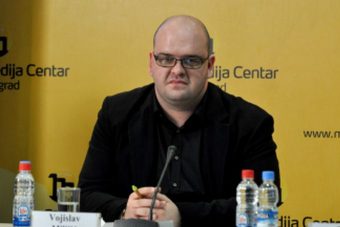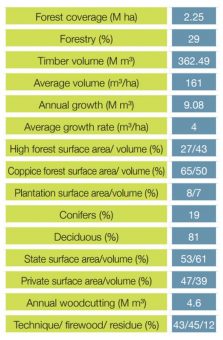
In March 2015, UNDP presented the project ‘Reducing barriers for rapid biomass market development in Serbia.’ It’s just one of many projects that encourage the increase of biomass participation in energy production in Serbia. It is well-known data, which were also used by UNDP, that biomass accounts for 61% of the total potential of renewable energy sources.
We talked to Mr. Vojislav Milijić about such activities and about the plan which envisages 27% of energy production from renewable energy sources by 2020. He stands for one of the most devoted activists when it comes to biomass. On behalf of the companies “Foragrobio CC” and “Serbio” he has given Energetski Portal a lot of information concerning these topics.
EP: Foragrobio is a consulting Company, while SERBIO is National Association for biomass and they strive to achieve the objectives in the field of environment. These companies have existed since 2012. Can you tell us something more about both legal entities in which you are engaged?
Vojislav Milijić: “Foragrobio CC” Ltd was founded in 2012. It is specialised in providing consulting services in forestry, agriculture and biomass usage. Since the day of company’s establishment till today, we have had an opportunity to collaborate with a number of primarily foreign companies engaged in different activities such as investments in forestry and agriculture, through investments in district heating plants and biomass power plants. We have also participated in the development of various feasibility studies. These studies were primarily tied to specific projects which involve the use of biomass. In addition to consulting services, Forgrobio CC Ltd. is recognized as a reliable partner in projects’ development. More information about the company can be found on www.foragrobio.rs.
National Association for biomass SERBIO brings together companies, NGO’s and experts that are in different ways involved in biomass usage or in improving biomass usage. Currently, SERBIO has 32 members and those are mainly companies which deal with biomass usage. SERBIO is active in the implementation of international projects, and at the moment we are conducting BioREs project (coordinated by the Bavarian GIZ) together with 8 partners from 7 EU countries. The project is financed from the Fund Horizon 2020 of the European Commission. The aim of BioRES Project is establishing of trade and logistics centers for wood biomass in Serbia, Bulgaria, and Croatia. More information about SERBIO can be found on www.serbio.rs and about the project on www.bioresproject.eu.
EP: You have recently held a presentation at the conference, which was organized by the Delegation of German Economy in Serbia. The conference was about biogas and biomass. Would you be so kind as to bring up the most important facts, statistics, and information on the use, production, and resources that Serbia has?
Vojislav Milijić: You can find more details in the table which I enclose. In short, the potential of biomass in Serbia are huge, but the realization is at a low level. The fact that wood biomass in Serbia is used for the production of other products (pellets, chipboard), which are primarily assigned to export, is a particular problem. On the other hand, we import fossil fuels and export products based on biomass, instead of using those products locally and thus reduce energy dependence. Also, huge amounts of biomass are used very inefficiently (as firewood), which again reduces potential amounts that could be used more efficient (in CHP or district heating plants). Due to all these reasons, we have a situation in which the production of wood biomass is rather limited since the large quantities have already been used. An additional problem is the lack of organization of the private forest sector which owns over 50% of forest resources. These forest resources are mainly used in an unplanned way and under the pressure of the unfavorable economic situation.
The production of agricultural biomass is very low compared to its potential. There are significant possibilities for its growth. Nevertheless, the use of agricultural biomass is specific and it requires a special logistics concept and a large storage area, which represents a particular challenge for investors.
 The most important opportunities for the usage of biomass in Serbia are:
The most important opportunities for the usage of biomass in Serbia are:
• Energy crops, especially willows and poplars on land which do not provide adequate yield as traditional crops
• Pellet production, but only if there is a guaranteed sale, because the competition is extremely large in both domestic and foreign market, and the use of it is decreasing in most countries of Western Europe
• Heating plants on wood or on agricultural biomass through the Public-Private Partnership model or through the investments of the local governments
• Power plants of CHP plants on agricultural biomass used primarily for the energy production in industrial zones
EP: Is it possible to increase the percentage of biomass usage at a local level? What suggestions would you make?
Vojislav Milijić: Yes, and it would be very simple. You just need to replace fossil fuels with biomass. More than 20 municipalities in Serbia are currently working on the development of biomass power plants and they are at different stages, but I think that we can expect the first operating power plants on wood biomass next year. These projects were developed with the support of German Development Bank (KfW), and some of those with the support of GIZ DKTI projects or the support of other institutions. I remind you that one of the heating plants in Sremska Mitrovica has already been using agricultural biomass (sunflower husk). As far as the fuel cost is concerned, biomass is competitive in relation to crude oil and natural gas, and it does not pollute the environment as coal. The most common obstacles for local utility companies are investments in biomass boilers, but still in addition to KfW soft loans, there is a possibility as well as the interest of the investors in the public-private partnership. The private partners would be the holders of the investment for the energy production, while the public partner would carry out distribution in these partnerships. To some extent, the obstacle is also the current decline of oil prices and thus the heavy oil, which is the reason why the decision on the replacement of fuel and introduction of biomass in heat production system is delayed. However, I think that this is only temporary postponement because even with these prices, biomass is more cost effective option in long-term, which unlike other imported fossil fuels provides opportunities for development of local communities.
EP: The Statute of SERBIO Association says that the objectives for the development of bioenergy sector market are raising the awareness, strengthening of Public-Private Partnerships, organizing workshops and conferences. What is your experience and do you manage to achieve visible results in all these fields? What would be your observations and remarks? Where do you see progress?
Vojislav Milijič: I personally have been dealing with the use of biomass since 2009 and if I was to compare the situation then and now, I would say that Serbia has made a huge progress especially when it comes to raising awareness. A series of events (conferences, fairs, etc.), on which the biomass usage is one of the topics in addition to other renewable energy resources, tell us how topical biomass actually is. Our association SERBIO has made a contribution to this progress in addition to other organizations (GIZ DKTI, UNDP and others). Things in which Serbia generally legs behind, not only Western Europe but also the nearest neighbors are the concrete projects of energy production based on biomass, as well as the increase of energy efficiency while using biomass. Still, I think we will see the first results in the near future in these fields also, in the first place because Serbia has professional, technical and financial capacities for the implementation of such projects.
Interview by: Vesna Vukajlović
This interview was first published in bulletin “Renewable Energy” on June 1st 2016.

